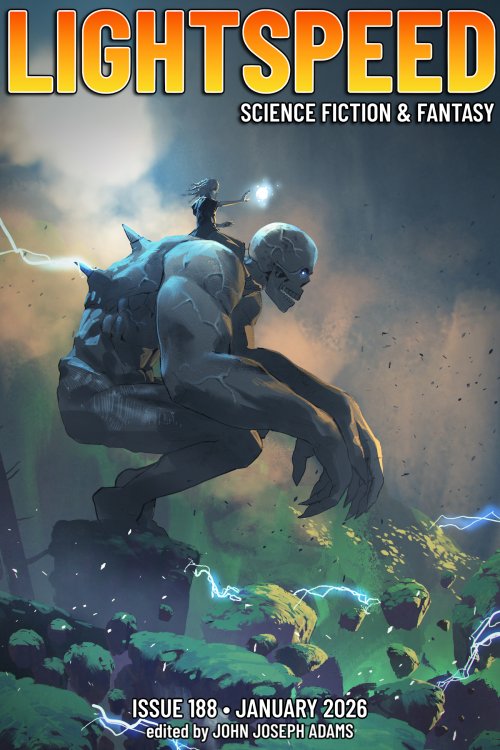Strong openings are vital, particularly in short stories where you have so much less word count to dedicate to the story as a whole. In the barest opening paragraphs of “Time Shards,” you manage to capture character, location, and the tone of the story in a few deft strokes. How do you approach the creation of a solid opening when writing short fiction? Do you find the process differs significantly from writing the opening of a novel?
I start with a situation and decide what character can best carry the reader through the action. In this case, Terry Carr called me up and said he had a hole to fill in his anthology, Universe. The hole was about 3,000 words, he needed a story with some science in it, and within a week. I was teaching two physics courses, one with 400 students, the other upper division plasma theory. Plus I had an experiment running seven days a week in my lab. So I thought about it during the weekdays, and saved Sunday to write the story. I let my unconscious do most of the work.
Where did you find the inspiration for “Time Shards”?
From a letter published in the Proceedings of the IEEE (August 1969, pp. 1465-6), which I often consulted. I had come upon it and filed the idea away. It sprang to mind when I got Terry’s call, so I read up some pottery lore, and dimly recalled doing some pottery on a turntable as a boy. Then I wondered about what the meaning of such an accidental message might be. Choice of point of view character is essential, once you have the basic idea. I liked seeing this from a bureaucrat distance, to show from outside the real pivot person, the scientist who’s frustrated by his finding.
I sat down and wrote the story in one afternoon. Letting it flow was fun, on a manual typewriter, with hand corrections to produce a final draft. (I hated retyping.) Then Xeroxed it and sent to Terry. I’d never reread it until today, thirty-seven years later. Quite compact, makes a point I explored in my nonfiction Deep Time in 1999, a study of how humanity communicates across millennia.
An X-Files episode swiped this idea. Some old pot “caught” Jesus saying a word that brought Lazarus back to life, while the pot was being formed. So the idea was that if you could play back Jesus, you could resurrect anyone within the sound of the pot. Star Trek-y science.
“Time Shards” is a time travel story where the time machine is history itself, thereby subverting the time machine trope all together. Many writers can’t see beyond the edges of their own boxes to then explore such new ideas. When you first started writing, were there any particular tropes or sacred cows that tempted your imaginary tipping lance?
Deep Time and Timescape reflect my concerns as a physicist with the still mysterious connection of space-time, and what it implies for possible future models of our universe. I always looked askance at the Wellsian time travel idea, projecting someone into another era. I thought any physics that made connections between different ages possible would first be used to send a message—far easier than a person. So I wrote Timescape as a novel about how physicists think on such subjects, doing experiments, sending messages backward in time for a real, vital reason, not just research. I was sure it would be an obscure, eccentric work of concern to few, and was quite wrong.
If you were given the opportunity to place something in a time capsule, what would you choose and why?
Consider the end of my story: “Look at that.” Hart gestured. “The Vault. Our own monument to our age. Passing on the legacy. You, me, the others—we’ve spent years on it. Years, and a fortune.” He chuckled dryly. “What makes you think we’ve done any better?” So I’d enclose items typical of our time, from my vantage. Plus a map of where all the thousands (yes!) of time capsules are buried. Most have already been forgotten, as I describe in Deep Time.
You are known for your award-winning science fiction, your work as a physicist, and your support of NASA and the Mars Society. Do you feel science fiction has a place in supporting the continued awareness of the importance of scientific study to humanity’s future?
Of course—we’re imagination constrained by experiment and evidence, so are like a road map of possible voyages humanity can take. We’re also the apes who got out of Africa, so our quest will continue using tools we devise. The most cherished idea we can put forward is the expansion of human horizons, in all meanings of those words.
What’s next for Gregory Benford? What can fans expect from you in the coming months?
I have stories coming out in F&SF, Analog, and a new Jonathan Strahan anthology, his Infinity series. Within the next two years I’ll have a novel, Rewrite (about time again) and an untitled alternate history of the Manhattan Project (another scientists-at-work novel). Then a novel about a SETI librarian . . .
Enjoyed this article? Consider supporting us via one of the following methods:










